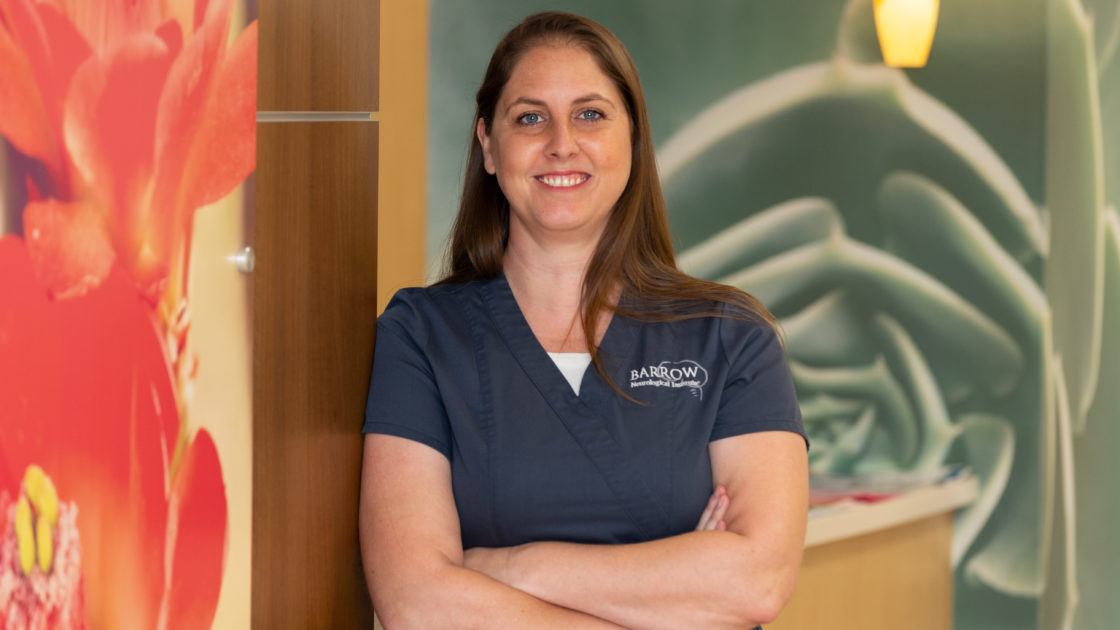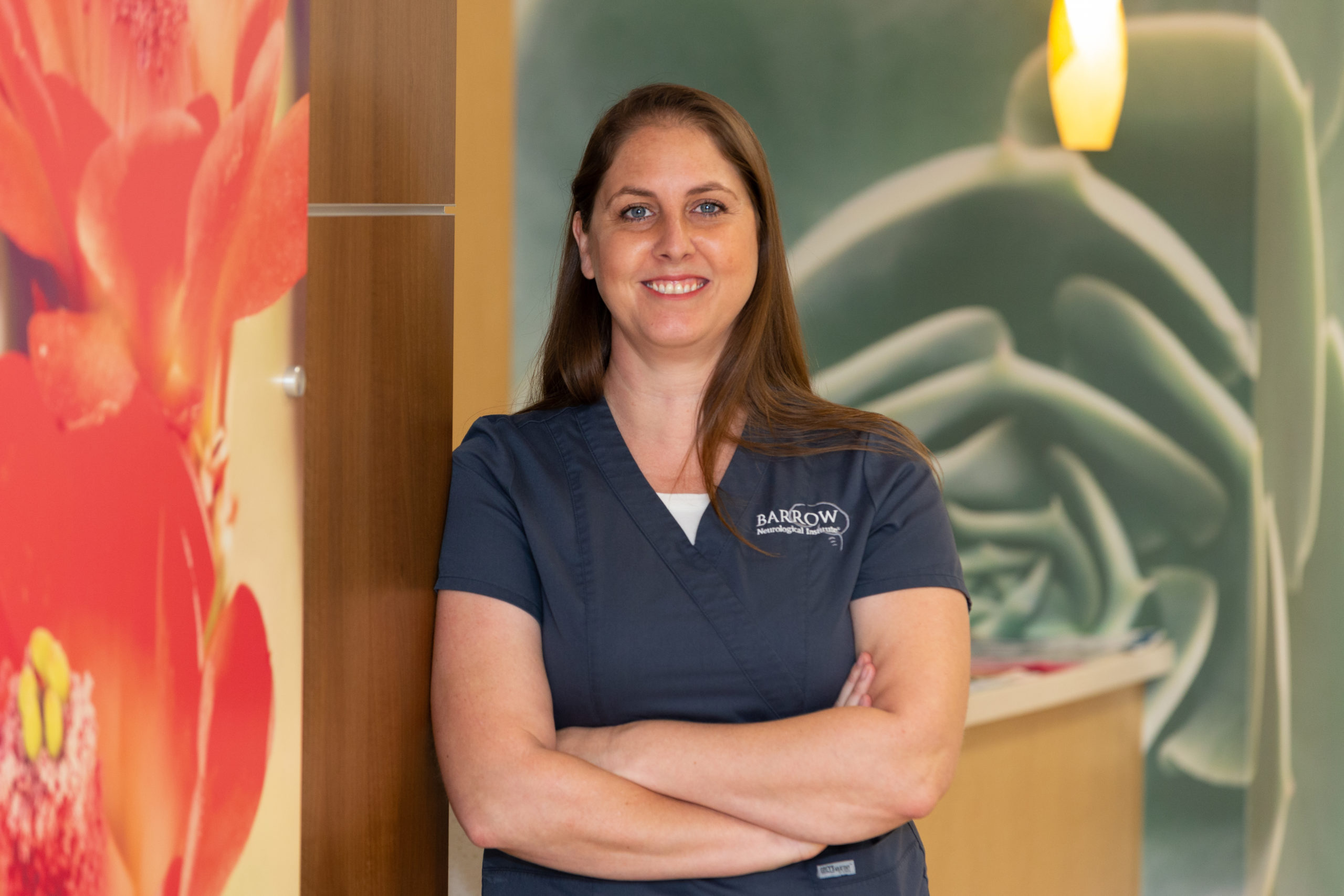
Meet Jacki Garcia: Nurse Navigator, Neurosurgical Oncology
“Dr. Nader Sanai has almost 800 active patients,” she confirms. “As a nurse navigator, my responsibility is to guide them from diagnosis through the treatment process and continue to follow them after their hospital stay.”
Many people describe brain tumor treatment as more of a marathon than a sprint. Treatment often requires a multifaceted approach. Depending on the type of tumor, it may consist of a combination of neurosurgery, radiation therapy, and chemotherapy. Patients with aggressive tumors that don’t respond to the standard of care may also participate in clinical trials.
Recovery can be a long haul too, sometimes involving inpatient and outpatient neuro-rehabilitation. And a patient’s journey typically doesn’t end there. Experts usually recommend regular follow-up visits and imaging tests so that they can detect and treat any tumor recurrence as soon as possible.
Navigating this journey can be overwhelming, which is where Garcia comes in.
“Brain tumor patients and their caregivers are often tasked with the difficult job of balancing a large team of multidisciplinary specialists working on their case,” said Dr. Sanai, director of the Ivy Brain Tumor Center and a neurosurgeon at Barrow. “Our patients know that Jacki will always be there to navigate them through these difficult waters.”
A Day in the Life of a Nurse Navigator
On a typical day, Garcia begins by rounding on Dr. Sanai’s patients in the hospital to establish rapport and to update him on how they’re doing. She then spends much of her day fielding questions from patients and families and coordinating their appointments, either over the phone or in Dr. Sanai’s clinic.
“I’m really just somebody to help ease the process and who is a little bit more accessible than trying to get a hold of a doctor sometimes,” Garcia said. “I also help to break down the information into more patient-friendly terms.”
Brain tumor patients and their caregivers are often tasked with the difficult job of balancing a large team of multidisciplinary specialists working on their case. Our patients know that Jacki will always be there to navigate them through these difficult waters.
Nader Sanai, MD, Barrow Neurosurgeon & Director of the Ivy Brain Tumor Center
As part of her commitment to patient education and outreach, Garcia plans events for patients and families. She also facilitates the twice-monthly Brain Tumor Support Group. While the COVID-19 pandemic has put in-person events on hold, the support group still meets virtually.
Garcia also participates in the Barrow Tumor Board, a weekly meeting of brain tumor experts. The Tumor Board reviews and discusses patient cases to determine the best course of treatment.
Since the opening of the Ivy Brain Tumor Center in 2018, Garcia has played a key role in streamlining the clinical trials process for patients. The Ivy Brain Tumor Center is the largest Phase 0 clinical trials program in the world and the first of its kind for neuro-oncology. Ivy Phase 0 trials accelerate the drug testing and approval process, allowing new drug combinations to be evaluated in patients within 10 days.
“Jacki’s compassion, optimism, and dedication set a high standard that we all strive to meet at the Ivy Brain Tumor Center,” Dr. Sanai said.
Becoming a Nurse
Garcia traces her interest in medicine back to her high school years. When she was 14 years old, her niece died at St. Joseph’s Hospital and Medical Center—where Barrow is located—after a traumatic event.
“I couldn’t really understand why the doctors couldn’t fix it,” she said, as tears welled in her eyes. “Ever since then, I’ve always kind of been interested in medicine.”
She planned to complete nursing school and then go onto medical school to become a doctor. Her path changed when she fell into a nursing job at the very hospital where she lost her niece.
While pursuing her associate degree in nursing from Phoenix College, she worked as an emergency medical technician (EMT). When the ambulance company’s contract ended three months before her graduation, she found herself suddenly in need of a job.

Garcia applied to St. Joseph’s Hospital and Medical Center as a certified nursing assistant (CNA). The hospital had no CNA positions available but, given Garcia’s upcoming graduation, offered to interview her for a registered nurse (RN) position in the Neuro-Intensive Care Unit at Barrow.
“I ended up taking the job in the Neuro-ICU and honestly just kind of fell in love with it,” she said.
Instead of attending medical school, she stayed in the Neuro-ICU. While there, she earned her Bachelor of Science in Nursing from Grand Canyon University.
After seven years on the unit, she felt ready for a change and a work schedule that would allow her to spend more time with family and friends.
“This is an amazing career because there’s always flexibility and there’s always change if you need it,” she said.
Garcia applied for the role of neurosurgical oncology nurse navigator at Barrow, a position Dr. Sanai helped to create. He recognized the benefit a nurse navigator would have for patients with brain tumors.
Accomplishments and Aspirations
Growing the role of the nurse navigator and expanding the support system for patients and families is Garcia’s proudest career accomplishment.
“Dr. Sanai is very supportive of the things that I throw his way,” she said. “As long as it’s about patient support and beneficial to patients, he’s always all in on it. He’s given me opportunities to stretch my wings and make this role my own.”
Garcia has more work she wants to do, though. She still sees opportunities to fill gaps in support services for patients with brain tumors and their care partners.
If I can walk out of here at the end of the day and feel like I helped make it a little bit easier for somebody, I feel like I did a good job that day. That’s the most rewarding aspect of it.
-Jacki Garcia, RN, BSN, CNRN, Nurse Navigator, Neurosurgical Oncology
There’s also more work to be done in treating aggressive brain tumors. Seeing patients lose their battle with a brain tumor after exhausting their treatment options is the hardest part of Garcia’s job.
“I cry with my patients and their family members,” she said. “I don’t believe in having thick skin as a nurse. It’s OK to have those emotions, I think.”
But one of the reasons Garcia enjoys working for Barrow specifically is the cutting-edge work that allows her to give patients hope.
“The doctors around here are so brilliant,” she said. “In the Ivy Center, our whole focus is clinical trials, so it’s really pushing to find new drugs and new ways to treat these tumors.”
At the end of the day, Garcia measures her success by the difference she is able to make in the lives of those patients and families listed on her computer screen.
“Even if it’s a benign tumor, it’s a pretty significant event to go through,” Garcia said. “If I can walk out of here at the end of the day and feel like I helped make it a little bit easier for somebody, I feel like I did a good job that day. That’s the most rewarding aspect of it.”
